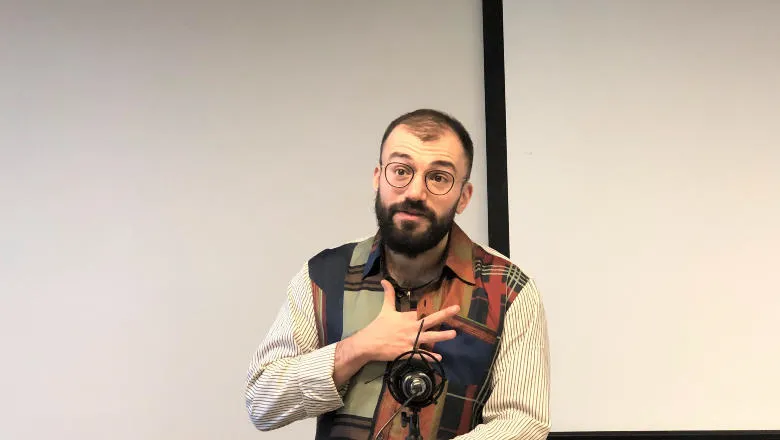"Some men used this to reject the medical diagnosis of homosexuality as an inverted or third gender and create a positive identity within this framework. The idea was to emulate the greatest empires of the Greeks and Romans through this form of homosexual attachment. However, this mode of attachment was overcome post-war and didn’t continue in the liberation movement, though there remains a hyper-masculinised gay sex culture"
Ben Miller
15 February 2023
Historian and co-author of 'Bad Gays' discusses theories of identity and sexuality with students
To mark LGBT+ History Month, the historian and co-author of 'Bad Gays: A Homosexual History', met with students from the Department of War Studies to discuss the main theories of identity, sexuality and gender highlighted in the publication.

How does the construction of masculinities intersect with the power and invention of homosexuality as a political project? How does this intersection play a role in war and violence? How have theories of identity and sexuality evolved? These are some of the questions answered by Ben Miller, historian and co-author of the book 'Bad Gays: A Homosexual History' during one of the activities organised by the School of Security Studies to commemorate LGBT+ History Month.
During the book presentation, the author read some excerpts highlighting Frederick the Great, the second King of Prussia and a pioneer of enlightened monarchic rule, as his sexuality has been a subject of debate for centuries as an object of masculinist gay identification and a symbol of statecraft and militarism.
"The book tells the story of the shadow history, the counter-history of the transition of the invention of homosexuality as a social category. […] It's fascinating to examine the masculinist figures and the public-private divide, and that's why I wanted to talk about Frederick the Great today", added Miller.
The book, published in May 2022, has been recognised by The Guardian and The Los Angeles Review of Books as an opportunity to understand a unique perspective on the history of homosexuality by integrating queer studies and interrogations of gay identity.
During the activity, Miller also discussed some of the main theories of identity and sexuality related to war and violence with Anna Plunkett, Lecturer in International Relations, and Raul Zepeda, PhD candidate at the School of Security Studies.
Miller also referred to the intersection of masculinity and homosexuality, particularly in Germany, and its relationship with racist, misogynistic, and upper-class politics.

Another key topic was the evolution of the gay rights movement and how its priorities have changed over time. Miller highlighted the shift from the liberation politics of the 70s and 80s, which focused on resistance and activism, to the early 2000s liberal gay rights movement, which sought integration into mainstream society through equal military service.
The author also commented that changes in the understanding of sex and gender systems are also occurring due to global reactions, particularly in media outlets.
"We are going through a crisis in our traditional categories and systems. It is uncertain how younger generations, those in their 20s and 30s, will view these changes as so many other significant events are taking place in the world. As a result, we can use either approach this shift with a combination of amusement and excitement, or we can resist and view it with fear. It is a time of great change, and it is up to each individual to determine how they will approach and react to this transformation"
Ben Miller
To join other in-person or online events organised by the School of Security Studies visit https://www.kcl.ac.uk/security-studies/events


